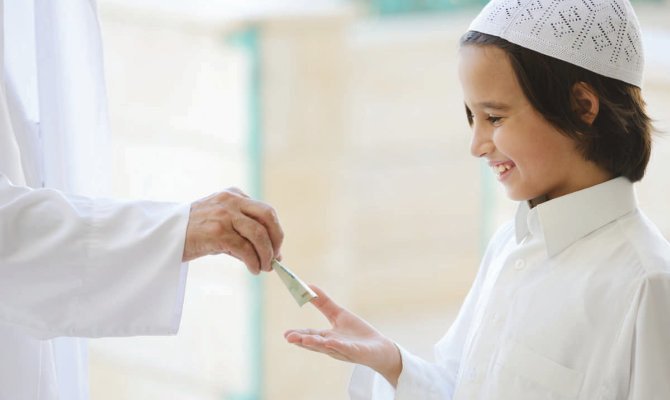
- ARAB NEWS
- 18 Jul 2025

Deemah Al-Khudair
JEDDAH: As Muslims around the world are celebrating Eid Al-Fitr in their own unique ways, children in every nation tend to always steal the spotlight with their tireless demands for Eidiya money.
Similar to Halloween in the west, children wait eagerly for this time of the year so they can dress up, visit one household to the next, and receive as much Eidiya money (and chocolates) as possible.
However, due to the ongoing coronavirus (COVID-19) pandemic, many Saudis turned to electronic payments to give out Eidiyas this year. Still, others prefer the old-fashioned way of handing out Eidiyas in cash while also taking COVID-19 health precautions into consideration.
Saudi dentist Jameela Al-Ghamdi, 29, said being deprived of family gatherings for Eid Al-Fitr last year was frustrating.
“It was so strange to go through,” she told Arab News. “We never skipped visiting our families on such special occasions.”
She is now relieved because people in her family susceptible to the virus have received the vaccine jab and these special occasions can happen again.
“I am so happy to dress up with my sisters and also visit family members I have not seen in an unfairly long time,” Al-Ghamdi said.
Her family, although mostly vaccinated, prefers to give out Eidiyas electronically, as Al-Ghamdi says she is a fan of technology.
“We tried giving out Eidiyas through STC Pay last year and it was very quick, simple and convenient. No need to break down SR100 at minimarkets anymore,” she said.
Ali Mansour, a 33-year-old Saudi industrial engineer at Saudia airline, said the best part of Eid is visiting family. He also added the occasion is not the same without gatherings. Mansour’s family started giving out Eidiyas electronically long before the pandemic because of its convenience.
“Way before the pandemic and the creations of such platforms like STC Pay, we gave out Eidiyas through bank transfers,” he told Arab News. “Electronic payments are not something new to us. My dad would always transfer the Eidiya into my account, never in cash.” He added that the last time he received Eidiya in cash was probably back in high school.
Young children are the most significant part of the Eid celebration, said Mansour, as they will receive Eidiyas in cash since they cannot use devices.
Saudi Lujain Al-Jehani, 27, said Eid Al-Fitr is extra special this year because people were deprived of the holiday gatherings last year.
“Due to the pandemic, we did not have the opportunity to celebrate together,” she told Arab News. “We are so excited and thrilled. We are going to prepare cakes and activities that we were deprived of last year.”
Al-Jehani’s family prefers to give out Eidiyas in person: “The experience is different, holding cash in your hand,” she said.
Al-Jehani added that most of the elderly in her family do not know how to use electronic payment platforms.
Saudi medical student Renad Bajodah, 25, said Eid celebrations are important experiences and will have a lasting impact on a child’s memory.
“Eid means joy to me. It means coming together and honoring the days of our lives, and celebrating after the completion of the holy month of Ramadan,” Bajodah told Arab News.
“The excitement of Eid’s eve is what is most beautiful to me, seeing kids wearing their new pajamas all happy on the night of Eid. It also teaches parents how to give to their children. To give them the best experience and beautiful childhood memories.”
While Bajodah’s family still prefers Eidiyas in cash, they sanitize them thoroughly before delivering in carefully closed envelopes. They like the “traditional old school style,” he said.
Saudi Yara Ahmad, 27, who works in the market research industry, said Eid Al-Fitr means a lot to her. The whole experience from new clothes, delicious food and candy, family gatherings and Eidiya money is something adults and children alike look forward to every year.
Electronic Eidiya did not bode well for her family which continues to distribute cash to children while keeping in mind the sanitization part and necessary precautions.
Saudi Salman Al-Otaibi, 32, who prefers the old-fashioned way of giving out Eidiyas while following hygienic measures, said a new voting poll for Eidiyas that has been circulating a week before Eid Al-Fitr takes away a special element.
“The idea has nothing to do with the purpose of Eidiyas and bringing a smile on children and adults’ faces,” he told Arab News.
“Because it has become a contest and everyone is running after people in groups and social media sites to vote. I think it is far from what Eidiya is supposed to mean.”